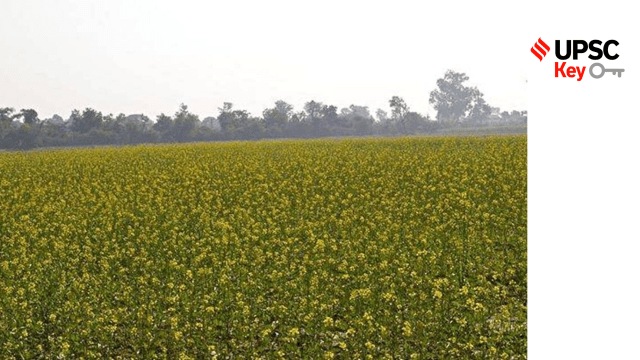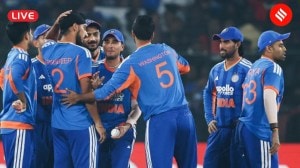
First GM food crop may be on way, mustard trials get nod
Syllabus:
Preliminary Examination: Economic and Social Development-Sustainable Development, Poverty, Inclusion, Demographics, Social Sector Initiatives, etc.
Mains Examination: General Studies III: Major crops-cropping patterns in various parts of the country, – different types of irrigation and irrigation systems storage, transport and marketing of agricultural produce and issues and related constraints; e-technology in the aid of farmers.
Key Points to Ponder:
• What’s the ongoing story- The Genetic Engineering Appraisal Committee (GEAC) under the Union Environment Ministry has approved seed production “prior to commercial release” of India’s first indigenously-developed transgenic hybrid mustard. It opens up possibilities for India’s first genetically modified (GM) food crop by farmers amid opposition from green groups and the so-called swadeshi lobby affiliated to the ruling party.
• What exactly is hybrid mustard or Dhara Mustard Hybrid-11?
• So, how has hybridisation been achieved in mustard?
• What has Genetic Engineering Appraisal Committee (GEAC) now done?
• Why did it take so long for Genetic Engineering Appraisal Committee (GEAC) to clear?
• So, will Indian farmers finally plant GM mustard?
• For Your Information-DMH-11 contains two alien genes isolated from a soil bacterium called Bacillus amyloliquefaciens that enable breeding of high- yielding commercial mustard hybrids. Proponents of the GM technology-based crop say it is necessary for boosting domestic oilseed and vegetable oil production. India annually produces only 8.5-9 million tonnes (mt) of edible oil, while importing 14-14.5 mt that entailed a record foreign exchange outgo of $18.99 billion in 2021-22 (April-March).
• Genetic Engineering Appraisal Committee (GEAC)-Know in detail
Other Important Articles Covering the same topic:
📍Understanding GM mustard
Story continues below this ad
Russia alerts Rajnath on ‘dirty bomb’, he warns against n-option
Syllabus:
Preliminary Examination: Current events of national and international importance.
Mains Examination: General Studies II: Effect of policies and politics of developed and developing countries on India’s interests, Indian diaspora.
Key Points to Ponder:
• What’s the ongoing story- Russian Defence Minister Sergei Shoigu called up Defence Ministers of India and China Wednesday to convey Moscow’s concern about a purported Ukrainian plan to use a “dirty bomb”, repeating an allegation that Ukraine and the West have already rejected.
• What is dirty bomb?
• Why is dirty bomb used?
• What does Russia allege?
• Why did Russia make its ‘dirty bomb’ claim?
• Has a dirty bomb been used before?
• How much damage dirty bomb can do?
Other Important Articles Covering the same topic:
📍What is a dirty bomb and why is Russia talking about one now?
Story continues below this ad
📍Putin accuses Ukraine of ‘dirty bomb’ plans, says world conflict risks high
THE EDITORIAL PAGE
A misleading exit
Syllabus:
Preliminary Examination: Current events of national and international importance.
Mains Examination: General Studies II: Important International institutions, agencies and fora- their structure, mandate.
Key Points to Ponder:
• What’s the ongoing story- Ramanathan Kumar writes: Under the circumstances, India will have to continue mustering all available instruments and options to deny Pakistan operating space to wield the jihadi weapon, till such time as there is convincing evidence of a consensus among the generals in Rawalpindi that the weapon has outlived its utility and needs to be renounced once and for all.
• Quick Recall-On October 21, the Financial Action Task Force (FATF), the global money laundering and terrorist financing watchdog, announced the removal of Pakistan from its “Grey List.”
• What is the Financial Action Task Force (FATF)?
Story continues below this ad
• How many lists are there under Financial Action Task Force (FATF)?
• What is FATF GREY list?
• Why Pakistan was on it?
• How grey-list under FATF impacts country?
• Removal of Pakistan from FATF Grey List-how it will affect India?
• For Your Information- The FATF, a 39-member inter-governmental organisation with its headquarters in Paris, was set up in 1989 by the Group of Seven (G7) countries with the aim of setting global standards for countering the menace of money laundering. Following the terror attacks on September 11, 2001, the objective of countering the financing of terrorism was added to the FATF’s mandate. Later, its objectives were further expanded to counter the financing of proliferation of weapons of mass destruction.
Other Important Articles Covering the same topic:
📍Pakistan is off FATF’s grey list: what does that mean?
THE IDEAS PAGE
On the brink, together
Syllabus:
Story continues below this ad
Preliminary Examination: General issues on Environmental ecology, Bio-diversity and Climate Change – that do not require subject specialization.
Mains Examination: General Studies III: Conservation, environmental pollution and degradation, environmental impact assessment.
Key Points to Ponder:
• What’s the ongoing story-Ugo Astuto writes: Climate action has become a central feature of the strategic partnership between the EU and India, for a green and a resilient future. But we need to do more. We must demonstrate success through actual and effective implementation.
• What Is Climate Change?
• How Is Climate Change measured over time?
• What Causes Climate Change?
• What are the effects of Climate Change in every nook and cranny?
Story continues below this ad
• “The solutions and technologies are well within reach but we must plan, invest decisively, and most importantly, act now, leaving no one behind. Time is not on our side”- What solutions and technologies author is pointing to?
• “At the COP27 climate conference in November 2022, the international community and each country individually must set out what it has done and intends to do to limit the increase of global temperature to 1.5 degrees”-How?
• “In Europe, we are taking action on this with the Green Deal”-What is European green deal?
• What is the purpose of the European Green Deal?
• What Does the European Green Deal Mean for the world?
Story continues below this ad
• How the European Green Deal will improve the well-being and health of citizens and future generations?
• What India can learn from European Green Deal?
• “India is a key partner in the fight against climate change”-Brainstorm India’s initiative to fight against Climate Change
Other Important Articles Covering the same topic:
📍No COP out on climate justice
EXPLAINED
Anti-trust cases against Google, how regulator decided fine
Syllabus:
Preliminary Examination: Current events of national and international importance.
Main Examination: General Studies III: Effects of liberalization on the economy, changes in industrial policy and their effects on industrial growth.
Key Points to Ponder:
• What’s the ongoing story- Over two weeks, the Competition Commission of India (CCI) has fined Google twice — for abusing its dominant position in the market with its Android mobile operating system (OS) and for anti-competitive policies in its in-app billing and payment processing. Apart from levying a total fine of over Rs 2,000 crore, the anti-trust body has issued a slew of directions that could impact Google’s business.
Story continues below this ad
• Why the Competition Commission of India (CCI) has fined Google twice?
• What is the Android ruling?
• What have you understood by “Dominant position”
• What have you understood by “abusing its dominant position”?
• What is the Play Store decision?
• How is the penalty calculated?
• What is Google Play’s billing system?
• What happens If the app developers do not comply with Google Play’s billing system (GPBS)?
• So, why CCI imposed penalty on Google?
• What is the role of the Competition Commission of India (CCI) in India?
• Competition Commission of India (CCI)-Statutory Body or Constitutional Body?
• Monopolies and Restrictive Trade Practices Act, 1969 (MRTP Act) and Competition Act, 2002-Compare and Contrast
• Composition of Competition Commission of India (CCI)-Members and their Appointment
• Functions and Role Competition Commission of India (CCI)
• Landmark Judgements of Competition Commission of India (CCI)
Other Important Articles Covering the same topic:
📍Pay Rs 1,337 cr for abusing dominance: CCI to Google
📍Why has the CCI fined Google over Rs 1,300 crore for its Android devices?
AAP wants Lakshmi-Ganesh on currency: who designs notes and how?
Syllabus:
Preliminary Examination: Economic and Social Development-Sustainable Development, Poverty, Inclusion, Demographics, Social Sector Initiatives, etc.
Mains Examination: General Studies III: Indian Economy and issues relating to planning, mobilization, of resources, growth, development and employment.
Key Points to Ponder:
• What’s the ongoing story-Several Aam Aadmi Party (AAP) leaders, led by party chief Arvind Kejriwal, on Wednesday (October 26) asked the government to put pictures of Goddess Lakshmi and Lord Ganesh on currency notes in order to bring “prosperity” to the country.
• So, who decides what Indian bank notes and coins are supposed to look like?
• What role does the RBI play in issuing notes?
• And who decides on the minting of coins?
• How does RBI’s currency management work?
• What are the types of notes issued so far?
Other Important Articles Covering the same topic:
📍‘Gods on currency notes’: Other Opp parties fear heads AAP wins, tails they lose
For any queries and feedback, contact priya.shukla@indianexpress.com
The UPSC KEY Indian Express is now on Telegram. Click here to join our channel and stay updated with the latest Updates.

































